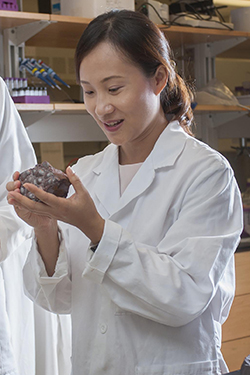Marc Weissburg has been appointed Georgia Tech’s newest Brook Byers Professor. The Brook Byers Professorship is the highest title bestowed at Georgia Tech for distinguished faculty who are specifically engaged in sustainability-related research and education.
Weissburg is a professor in the School of Biological Sciences and codirector of the Center for Biologically Inspired Design. He joined Georgia Tech in 1997, having earlier earned his B.S. degree in Biology from the University of California, Berkeley, and his Ph.D. in Ecology and Evolutionary Biology from the State University of New York, Stony Brook.
Weissburg's research interests concern chemical signaling by marine animals, marine community ecology, and predator-prey dynamics. His recent efforts have been concentrated in two areas: developing methods to suppress predation on juvenile oysters in farmed and natural communities and examining the biological and fisheries consequences of climate change and ocean acidification.
More broadly, Weissburg has a long-standing interest in comparative and interdisciplinary research and education. To this end, he has collaborated with industry groups, professional designers, architects, scientists, and engineers on the use of biologically inspired strategies to enhance human-built systems. Using principles derived from the examination of energy and material flows in ecological systems, he has helped to develop methods for determining material and energy use efficiency and resilience, and he has applied them to systems at scales ranging from neighborhoods and industrial complexes to large cities.
Concurrent to Weissburg’s appointment, five Georgia Tech faculty members were named Brook Byers Institute for Sustainable Systems (BBISS) Faculty Fellows. Among them is Yuanzhi Tang, an assistant professor in the School of Earth and Atmospheric Sciences.
Tang is interested in the complex interworking between human activities and the natural environment by exploring the chemical reactions occurring at the microbe-mineral-water interface from molecule to macroscopic scale. By combining laboratory-based analytical techniques with synchrotron-based X-ray techniques, she aims to understand the fate, transport, and bioavailability of metal and radionuclide contaminants and nanoparticles, as well as the biogeochemical cycling of important nutrients in complex environmental settings.
Tang has partnered with scientists in Georgia Tech and beyond to attack the problem of integrated contaminant elimination and resource recovery from biological wastes. The National Science Foundation has awarded Tang and her collaborators over $2.4 million over three years to figure out how to integrate and optimize multiple technologies to recover energy, water, and nutrients from biological wastes, while simultaneously reducing waste volume and removing the heavy metals, pathogens, and organic contaminants.
The other BBISS Faculty Fellows are
- Kate Pride Brown (School of History and Sociology),
- Emanuele Massetti (School of Public Policy),
- Cassandra Telenko (Woodruff School of Mechanical Engineering), and
- Perry Yang (School of City & Regional Planning).
In addition to their own work, the Brook Byers Professor and BBISS Fellows serve as a board of advisors to BBISS, helping to advance institute's vision, mission, values, and objectives across the community of sustainability-minded researchers, educators, and students at Georgia Tech.
EDITOR'S NOTE: This item was adapted from an article by Brent Verrill published on March 19, 2018, on the BBISS website. Information about Yuanzhi Tang was added.




